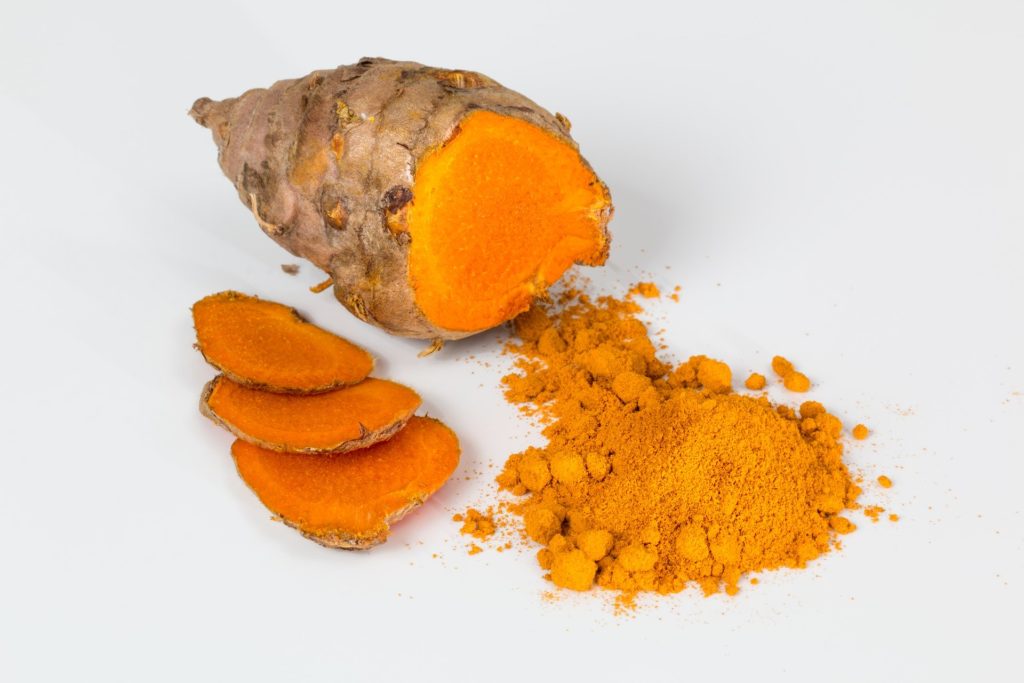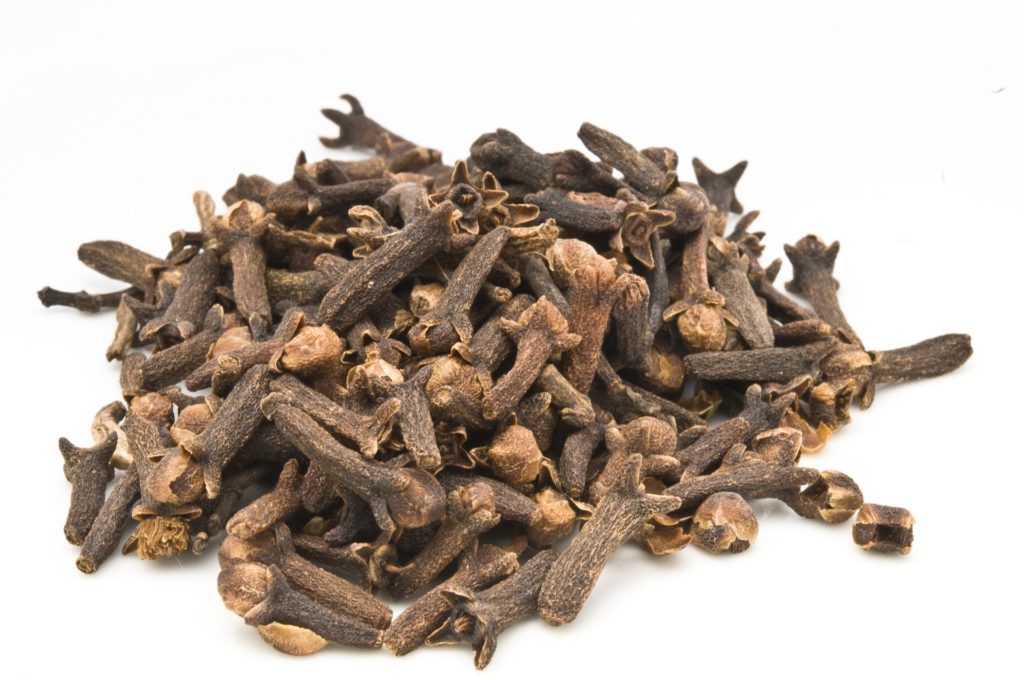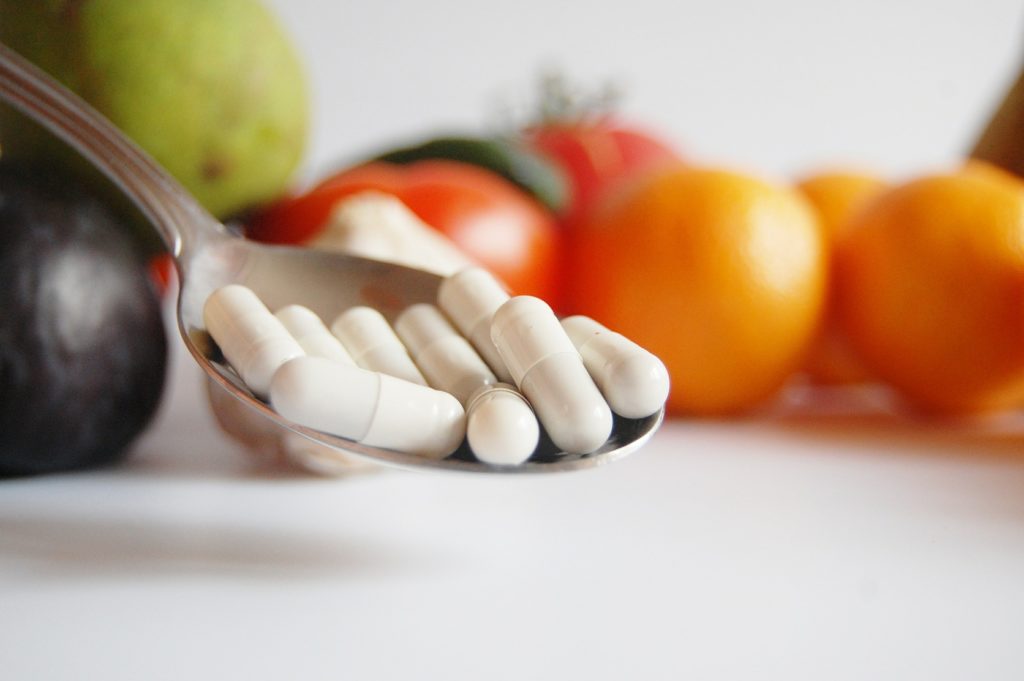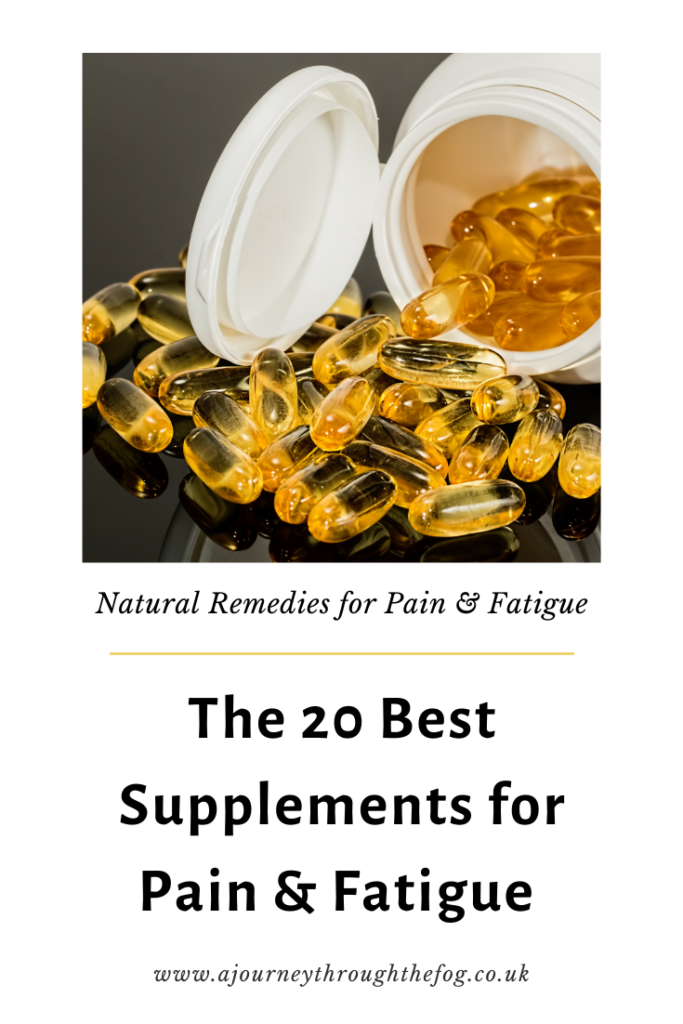
Pain and fatigue are probably the two most common symptoms across a whole host of medical conditions.
It is estimated that around 43% of people in the UK experience chronic pain – this equates to 28 million in the UK alone. In the US this figure is over 100 million, and Worldwide it’s 1.5 billion. Fatigue is also prevalent within society today, with growing numbers experiencing chronic, persistent fatigue. And for those of us living with chronic illness, debilitating fatigue is often a constant companion.
I have spent a lot of time over the years experimenting with different supplements to try to tackle these symptoms, and I know many of my followers have too. I also know many people like myself are hypersensitive to prescription medication and not everyone can tolerate the side effects. And sometimes we just want a natural alternative.
So we this in mind, I reached out to my followers to ask what supplements they find help ease their pain and fatigue. The responses were really interesting, and there were a few ideas I hadn’t heard of before.
I just want to say at this point; I’m not against prescription medication. Whatever helps you and makes life more bearable has to be a positive thing. And I’m not a medical professional, so if you have any concerns please speak to your doctor first. Also the dosing figures are just a general guide and may vary with each individual depending on needs and current diet.
20 Natural Supplements to Combat Pain & Fatigue
Here are the best supplements for pain and fatigue, as recommended by my readers;
1. CBD (Cannabidiol)

CBD was a popular recommendation from my followers, and it definitely gets a thumbs up from me too. It was mainly suggested for chronic pain, but long term use can also help with fatigue and brain fog. CBD oil (oral), CBD balm (topical) and E-liquids (vaping) were all mentioned as ways to utilise CBD to tackle chronic pain. It was reported to help with muscle and joint pain, as well as nerve pain.
Cannabinoids like CBD offer many health benefits but the one most sort after for the treatment of chronic pain is it’s powerful anti-inflammatory properties. If you would like to read more about the health benefits of CBD please read The Main Cannabinoids and Their Therapeutic Properties.
But CBD is not the only beneficial cannabinoid found in cannabis. I personally find CBG (Cannabigerol) just as effective as CBD for my pain, and it’s also really relaxing and helps me sleep. Improved sleep leads to reduced fatigue over time. A full spectrum CBD product contains an array of cannabinoids and terpenes, all of which can impact positively on our health, pain levels and fatigue. And CBDa is another cannabinoid that was recommended by my readers for it’s anti-inflammatory properties.
Rather than going into a lot of detail about CBD and other cannabis compounds, I will instead direct you to a few CBD educational posts I have written. What is CBD? Everything you need to know is a good place to start. Please also read How CBD Works: The Endocannabinoid System Explained and CBD Oil for Chronic Pain.
Recommended Dose: There isn’t a universally recommended CBD dose, as we all react differently to this compound. For more information please read How Much CBD Should I Take?
THC (Tetrahydrocannabinol) was another cannabinoid that was mentioned by my followers, and it’s one I have experimented with myself. Unfortunately THC is still illegal in the UK, and in many other countries around the world. Although THC is known for its psychoactive effects it also has many therapeutic properties too – it is nature’s painkiller. Numerous studies have shown THC to be an effective tool against chronic pain and inflammation.
2. Magnesium
It wasn’t a surprise to me to find magnesium was another popular choice with my readers. I use it myself everyday and I have definitely noticed a reduction in my pain levels. Magnesium can be taken orally (capsule or liquid), applied topically (oil spray or cream), and even added to your bath in the form of Epsom salts. My followers reported that magnesium was especially effective for muscle aches and pains.
Magnesium plays several important roles in the health of your body and brain. It is involved with energy creation, it helps convert food into energy, and also muscle movements: it is part of the contraction and relaxation of muscles.
Magnesium has also been shown to help fight inflammation. It reduces the inflammatory marker CRP and provides several other benefits. Magnesium may also help prevent migraines.
There are a few different types of magnesium, choosing the right one for you can be important. Magnesium is also a popular treatment for constipation, so you may want to avoid certain types of magnesium if you suffer from IBS and diarrhoea. I personally find magnesium glycinate is the kindest to my belly.
Different types of magnesium
- Magnesium glycinate. Often used to reduce muscle pain
- Magnesium oxide. Commonly used to treat migraines and constipation
- Magnesium citrate. Easily absorbed by the body and also used to treat constipation
- Magnesium chloride. Easily absorbed by the body
- Magnesium sulfate (Epsom salt). Generally, less easily absorbed by the body but may be absorbed through the skin. Commonly used to treat muscle aches and pains
- Magnesium lactate. Often used as a food additive
Recommended Dose: 200-400mg a day.
3. Coenzyme Q10
Coenzyme Q10 (CoQ10) was a popular choice to combat fatigue. Coenzyme Q10, also known as CoQ10, is a compound that helps generate energy in your cells. Your body produces CoQ10 naturally, but its production tends to decrease with age.
It’s involved in making adenosine triphosphate (ATP), which is involved in energy transfer within cells. Its other crucial role is to serve as an antioxidant and protect cells from oxidative damage.
CoQ10 isn’t just a treatment for fatigue, it has a wide range of health benefits and may even help to prevent headaches.
Recommended Dose: 90 mg to 200 mg per day.
4. Turmeric & black pepper

Turmeric has many scientifically-proven health benefits. Curcumin, found in turmeric, has strong anti-inflammatory properties. In fact, it’s so powerful that it matches the effectiveness of some anti-inflammatory drugs, without the side effects.
It is best to take turmeric with black pepper. Black pepper contains the bioactive compound piperine. Piperine has been shown to help relieve nausea, headaches and poor digestion and also has anti-inflammatory properties, but its most significant benefit is its ability to boost the absorption of curcumin by up to 2000%
Therefore by taking black pepper along with your turmeric supplement you can boost absorption of the main active ingredient, and increase the benefits you receive.
Recommended Dose: For anti-inflammatory effects; 1000-1500mg of turmeric extract a day.
5. Ginseng
Ginseng is well known as a nootropic (believed to enhance cognitive functions) supplement with brain-boosting properties. It has been used as a medicinal herb for thousands of years for many reasons, but most often for a mental energy boost.
Ginseng contains two significant compounds: ginsenosides and gintonin. These compounds complement one another to provide health benefits.
Ginseng has beneficial antioxidant and anti-inflammatory properties. It may also strengthen the immune system, and It has been shown to help fight fatigue and promote energy.
Recommended Dose: Overall, daily doses of 1-2 grams of raw ginseng root or 200-400 mg of extract are suggested. It’s best to start with lower doses and increase over time.
6. Omega-3 fatty acids

Omega-3 fatty acids have been shown to fight inflammation and therefore can reduce pain levels. Omega-3 fatty acids can reduce the production of molecules and substances linked to inflammation, such as inflammatory eicosanoids and cytokines.
But there are actually a multitude of health benefits associated with omega-3 fatty acids so it’s a great supplement for overall health.
Many omega-3 fatty acid supplements are made using fish oils. But there are vegan options too. Hemp seeds, chia seeds and linseeds are also good sources of Omega-3 fatty acids.
Recommended Dose: A minimum of 250–500 mg is recommended each day for healthy adults. However, higher amounts are often recommended for certain health conditions.
7. Boswellia
Boswellia is new to me – I had not heard of it until it was recommended by one of my readers.
Boswellia, also known as Indian frankincense, is an herbal extract taken from the Boswellia serrata tree. Because boswellia is an effective anti-inflammatory, it can be an effective painkiller.
Studies show that boswellia may reduce inflammation and may be useful in treating the following conditions:
- osteoarthritis (OA)
- rheumatoid arthritis (RA)
- asthma
- inflammatory bowel disease (IBD)
Recommended Dose: General dosing guidelines suggest taking 300–500 mg by mouth two to three times a day.
8. Rhodiola Rosea
Rhodiola, another supplement new to me, is most commonly used for increasing energy, endurance, strength, and mental capacity. It is also used as a so-called “adaptogen” to help the body adapt to and resist physical, chemical, and environmental stress.
Early research suggests that rhodiola might decrease fatigue in stressful situations.
Rhodiola extracts may also help protect cells from damage, regulate heartbeat, and have the potential for improving learning and memory.
Recommended Dose: The dosage and amount of extract varies between brands and product types. Please consult the label for dosage instructions.
9. Ginger Root

Ginger is among the healthiest spices on the planet. It is loaded with nutrients and bioactive compounds that have powerful benefits for your body and brain.
Ginger has been shown to be effective against muscle pain. These effects are believed to be mediated by the anti-inflammatory properties. There are also some studies showing ginger to be effective at reducing symptoms of osteoarthritis.
One of the traditional uses of ginger is for pain relief, including menstrual pain. In one study, 150 women were instructed to take 1 gram of ginger powder per day, for the first 3 days of the menstrual period. Ginger managed to reduce pain as effectively as drugs like ibuprofen.
Recommended Dose: Many different ginger extract products are available, all differing in strength and bioavailability. The dosing needed differs depending on the product taken. Please consult the product label.
10. D-ribose
D-ribose is a sugar molecule that makes up part of your DNA and the major molecule used for providing your cells with energy, ATP.
People with certain medical conditions may experience benefits from D-ribose supplements, including improved exercise performance and recovery of muscle cell energy stores after intense exercise.
Due to the association between some pain disorders and problems with energy metabolism, certain studies focus on whether D-ribose supplements can reduce pain.
In one study in 41 people with fibromyalgia or ME/CFS, improvements in subjective pain intensity, well-being, energy, mental clarity, and sleep were reported after receiving 15 grams of D-ribose daily for 17–35 days.
Recommended Dose: General dosage advice suggests 5mg, three times a day.
11. Glucosamine & Chondroitin Sulfate
Glucosamine plays a vital role in building cartilage, and many people take it as a supplement to treat arthritis and osteoarthritis. It occurs naturally in the fluid around the joints, in animal bones, bone marrow, shellfish, and fungi.
It has been shown to reduce osteoarthritis-related pain, stiffness, and swelling in the joints.
Chondroitin sulfate is part of a protein molecule that helps give cartilage its elastic properties and is thought to have an anti-inflammatory effect, which can help to reduce the painful swelling in the joints that occurs when the exposed bones in the joint rub together.
In addition, chondroitin sulfate may also help slow the breakdown of cartilage. Many scientists believe that chondroitin helps to reduce pain and improve range-of-movement in a number of ways.
These supplements are commonly taken together.
Recommended Dose: Supplements vary in strength and quality. Please consult the label for dosage instructions.
12. Arnica

Arnica is a European flower that has anti-inflammatory properties. It is often added to pain relieving gels and creams.
The active chemicals in arnica may reduce swelling, decrease pain, and act as antibiotics.
Arnica was also recommended by a couple of my readers for the treatment of fibromyalgia pain.
Recommended Dose: There is no specific recommended dose. With regards to arnica gel or cream – just apply as needed.
13. Acetyl-L-carnitine
L-carnitine is a naturally occurring amino acid derivative that’s often taken as a supplement, and it may have an impact on brain function.
There are different types of L-carnitine but the one recommended by my followers is Acetyl-L-carnitine (often called ALCAR)
It plays a crucial role in the production of energy by transporting fatty acids into your cells’ mitochondria. The mitochondria act as engines within your cells, burning these fats to create usable energy.
L-carnitine – specifically acetyl-L-carnitine – can have beneficial effects on brain function in various diseases. It may also increase oxygen supply to your muscles, and reduce muscle soreness after exercise.
Acetyl-L-carnitine is a common supplement suggestion for people with ME/CFS.
Recommended Dose: The standard dose of Acetyl-carnitine is 500-2,000 mg per day.
14. Cloves

Cloves are the flower buds of the clove tree, an evergreen also known as Syzygium aromaticum.
This common spice is also effective for pain caused by headaches, arthritic inflammation, and toothaches.
As well as containing several important vitamins and minerals, cloves are rich in antioxidants. Cloves are found in capsules or powder and oil form. It can also be used for topical pain relief. Eugenol, the active ingredient found in cloves, is a natural pain reliever.
Recommended Dose: The appropriate dose of clove depends on several factors such as the user’s age, health, and several other conditions.
15. Vitamin B Complex

Vitamin B complex is composed of eight B vitamins:
- B-1 (thiamine)
- B-2 (riboflavin)
- B-3 (niacin)
- B-5 (pantothenic acid)
- B-6 (pyridoxine)
- B-7 (biotin)
- B-9 (folic acid)
- B-12 (cobalamin)
Each of these essential vitamins contributes to your overall bodily function. B vitamins play a vital role in maintaining good health and well-being. As the building blocks of a healthy body, B vitamins have a direct impact on your energy levels, brain function, and cell metabolism.
Of all the B vitamins, B12 was the most commonly used amongst my followers. Vitamin B12 offers many health benefits – it can boost energy, improve memory, support bone health, help prevent heart disease, and even improve mood.
All B vitamins play an important role in your body’s energy production.
Recommended Dose: The recommended dose of each B vitamin varies depending on gender, age and whether you have certain underlying health conditions. Please read the label of the supplement you purchase for dosing instructions.
16. Vitamin C

Vitamin C is an essential vitamin, meaning it can’t be produced by the body. So if you have a restricted diet, a vitamin C supplement is important. It has many roles in your body and offers many health benefits.
Vitamin C supplements can help improve the absorption of iron from the diet. Vitamin C assists in converting iron that is poorly absorbed, such as plant-based sources of iron, into a form that is easier to absorb.
One of the main reasons people take vitamin C supplements is to boost their immunity. Vitamin C is involved in many parts of the immune system. Increased energy is another benefit reported by many people who suffer from chronic fatigue.
Recommended Dose: The recommended daily intake (RDI) for vitamin C is 75 mg for women and 90 mg for men. However, my body seems to respond well to high doses of vitamin C (1000-1500mg a day) Since taking these higher doses my overall health has improved, particularly my fatigue levels and brain function. I know many people with chronic illnesses experience benefits from high doses, although there isn’t any evidence to show these levels are needed.
17. Vitamin D

Vitamin D is sometimes called the ‘sunshine vitamin’ because it’s produced in your skin in response to sunlight. This supplement is particularly important for those of us who are housebound.
Vitamin D has several important functions. Perhaps the most vital are regulating the absorption of calcium and phosphorus, and facilitating normal immune system function.
Although vitamin D is not thought to target pain or fatigue directly, it can improve overall health and protect us from developing certain illnesses, and it was recommended by a few of my readers.
Recommended Dose: The RDI is 600 IU of vitamin D per day from foods. If you don’t get enough sunlight, your intake should likely be closer to 1,000 IU per day.
18. Iron
Iron is a mineral vital to the proper function of hemoglobin, a protein needed to transport oxygen in the blood. Iron also helps to preserve many vital functions in the body, including general energy and focus, gastrointestinal processes, the immune system, and the regulation of body temperature.
A shortage of iron in the blood can lead to a range of serious health problems, including iron deficiency anemia.
Insufficient iron in the diet can affect the efficiency with which the body uses energy. Iron carries oxygen to the muscles and brain and is crucial for both mental and physical performance. Low iron levels may result in a lack of focus, increased irritability, and reduced stamina.
Our restricted diets, and problems absorbing essential nutrients, mean people with chronic illnesses are often deficient in iron – leading to fatigue.
Recommended Dose: The recommended daily intake (RDI) for elemental iron depends on a person’s age and sex. Vegetarians and vegans also have different iron requirements. If you have an iron deficiency, please consult with your doctor for dosage instructions.
19. Zinc
Zinc is a nutrient that plays many vital roles in your body. Because your body doesn’t naturally produce zinc, you must obtain it through food or supplements.
Zinc is the second-most-abundant trace mineral in your body – after iron – and is present in every cell.
Zinc is necessary for the activity of over 300 enzymes that aid in metabolism, digestion, nerve function and many other processes. In addition, it’s critical for the development and function of immune cells
With regards to treating pain, zinc can decrease inflammation within the body. Zinc decreases oxidative stress and reduces levels of certain inflammatory proteins in your body.
Recommended Dose: In order to avoid overconsumption, stay away from high-dose zinc supplements unless recommended by a doctor. The recommended daily intake (RDI) is 11 mg for adult men and 8 mg for adult women.
20. Multivitamin (A-Z)

Multivitamins are supplements that contain many different vitamins and minerals, sometimes alongside other ingredients.
It’s quite common for people with chronic illnesses to be deficient in essential vitamins and minerals. Our bodies don’t always absorb vitamins effectively and we sometimes have restricted diets due to food intolerances. So adding a comprehensive multivitamin and mineral to your supplement routine is often a good idea to improve overall health. Many of these vitamins and minerals can also help reduce fatigue.
Thirteen vitamins and at least 16 minerals are essential to your health. The amounts contained within different brands of multivitamins varies greatly, so do some research.
Recommended Dose: As multivitamin products vary so much please consult the dosing instructions on the label. The amount you need will also depend on your current diet, health situation and any other supplements you are already taking.

Thank you to everyone who responded with their go-to supplements for pain and fatigue, I found them really interesting and I enjoyed researching all the options.
I hope this post has given you some ideas if you are looking to add supplements to your diet to help relieve your pain or fatigue.
What supplements would you recommend? Do you have any you would like to add?
For more personal stories, reviews, news, inspirational quotes and in-depth discussion, please head over to my Facebook page.

Such a valuable and informative post. I currently take Vitamin D and am starting a course of B12 too. I am going to look in to magnesium more though as I’ve heard lots of good stuff about this. Great post, thank you for sharing x
I love that you put this list together! I personally take a mix of CBD and THC oil before bed and during the winter time I take vitamin D tablets. Every few months I get my blood checked and get iron and B12 injections if needed.